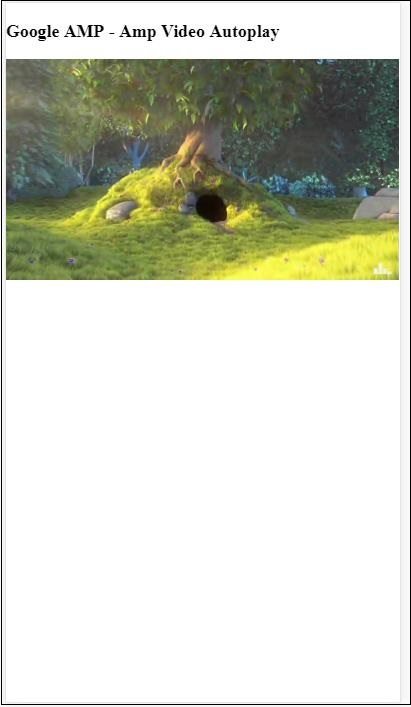GoogleAMP-ビデオ
amp-video in ampは、直接ビデオ埋め込みを再生するために使用される標準のhtml5ビデオです。この章では、amp-videoの操作方法と使用方法を理解しましょう。
amp-videoを使用するには、次のスクリプトを追加する必要があります-
<script async custom-element = "amp-video"
src = "https://cdn.ampproject.org/v0/amp-video-0.1.js">
</script>Amp-videoには、ロードするビデオリソースを持つsrc属性があり、実行時にampによって遅延ロードされます。その上、すべての機能はhtml5ビデオタグとほとんど同じです。
以下は、アンプビデオに追加されるノードです-
Source −このタグを使用して、再生するさまざまなメディアファイルを追加できます。
Track −このタグを使用すると、ビデオの字幕を有効にできます。
Placeholder −このプレースホルダータグは、動画が始まる前にコンテンツを表示します。
Fallback −このタグは、ブラウザがHTML5ビデオをサポートしていない場合に呼び出されます。
amp-videoタグのフォーマット
amp-videoタグのフォーマットをここに示します-
<amp-video controls width = "640" height = "360"
layout = "responsive" poster = "images/videoposter.png">
<source src = "video/bunny.webm" type = "video/webm" />
<source src = "video/samplevideo.mp4" type = "video/mp4" />
<div fallback>
<p>This browser does not support the video element.</p>
</div>
</amp-video>以下に示すような実用的な例を使用して、amp-videoを理解しましょう-
例
<!doctype html>
<html amp lang = "en">
<head>
<meta charset = "utf-8">
<script async src = "https://cdn.ampproject.org/v0.js"></script>
<title>Google AMP - Amp Video</title>
<link rel = "canonical" href = "http://example.ampproject.org/article-metadata.html">
<meta name = "viewport" content = "width = device-width, minimum-scale = 1,initial-scale=1">
<style amp-boilerplate>
body {
-webkit-animation:
-amp-start 8s steps(1,end) 0s 1 normal both;-moz-animation:
-amp-start 8s steps(1,end) 0s 1 normal both;-ms-animation:
-amp-start 8s steps(1,end) 0s 1 normal both;animation:
-amp-start 8s steps(1,end) 0s 1 normal both}
@-webkit-keyframes
-amp-start{from{visibility:hidden}to{visibility:visible}}@-moz-keyframes
-amp-start{from{visibility:hidden}to{visibility:visible}}@-ms-keyframes
-amp-start{from{visibility:hidden}to{visibility:visible}}@-o-keyframes
-amp-start{from{visibility:hidden}to{visibility:visible}}@keyframes
-amp-start{from{visibility:hidden}to{visibility:visible}}
</style>
<noscript>
<style amp-boilerplate>
body {
-webkit-animation:none;
-moz-animation:none;
-ms-animation:none;
animation:none
}
</style>
</noscript>
<script async custom-element = "amp-video"
src = "https://cdn.ampproject.org/v0/amp-video-0.1.js">
</script>
</head>
<body>
<h3>Google AMP - Amp Video</h3>
<amp-video controls
width = "640"
height = "360"
layout = "responsive"
poster = "images/videoposter.png">
<source src = "video/bunny.webm" type = "video/webm" />
<source src = "video/samplevideo.mp4" type = "video/mp4" />
<div fallback>
<p>This browser does not support the video element.</p>
</div>
</amp-video>
</body>
</html>出力
上記のコードの出力は次のとおりです-

amp-videoで使用可能な属性
amp-videoで使用可能な属性は、次の表にリストされています-
| シニア番号 | 属性と説明 |
|---|---|
| 1 | src <source>ノードが存在しない場合は、srcを指定する必要があり、https:// urlである必要があります。 |
| 2 | poster ポスターは、ビデオが始まる前に表示されるimgurlを取ります。 |
| 3 | autoplay この属性をamp-videoに設定すると、ブラウザがサポートしている場合にビデオが自動再生されます。ビデオはミュートモードで再生され、ユーザーはビデオをタップしてミュートを解除する必要があります。 |
| 4 | controls amp-videoにこの属性を設定すると、html5ビデオと同様のビデオのコントロールが表示されます。 |
| 5 | loop この属性がamp-videoに存在する場合、ビデオは終了すると再び再生されます。 |
| 6 | crossorigin この属性は、ビデオを再生するためのリソースが別のオリジンにある場合に明らかになります。 |
| 7 | rotate-to-fullscreen ビデオが表示されている場合、ユーザーがデバイスを横向きモードに回転させた後、ビデオは全画面表示されます |
AMPビデオの自動再生
ビデオを自動再生する必要がある場合は、autoplay属性を使用できます。この機能は、ブラウザのサポートに従って機能します。自動再生時には、ビデオはミュート状態になることに注意してください。ユーザーがビデオをタップすると、ミュートが解除されます。
以下に示す実用的な例の助けを借りて、自動再生機能を見てみましょう-
例
<!doctype html>
<html amp lang = "en">
<head>
<meta charset = "utf-8">
<script async src = "https://cdn.ampproject.org/v0.js"></script>
<title>Google AMP - Amp Video</title>
<link rel = "canonical" href = "http://example.ampproject.org/article-metadata.html">
<meta name = "viewport" content = "width=device-width,minimum-scale = 1, initial-scale = 1">
<style amp-boilerplate>
body {
-webkit-animation:
-amp-start 8s steps(1,end) 0s 1 normal both;
-moz-animation:-amp-start 8s steps(1,end) 0s 1 normal both;-ms-animation:
-amp-start 8s steps(1,end) 0s 1 normal both;animation:
-amp-start 8s steps(1,end) 0s 1 normal both
}
@-webkit-keyframes
-amp-start{from{visibility:hidden}to{visibility:visible}}@-moz-keyframes
-amp-start{from{visibility:hidden}to{visibility:visible}}@-ms-keyframes
-amp-start{from{visibility:hidden}to{visibility:visible}}@-o-keyframes
-amp-start{from{visibility:hidden}to{visibility:visible}}@keyframes
-amp-start{from{visibility:hidden}to{visibility:visible}}
</style>
<noscript>
<style amp-boilerplate>
body{
-webkit-animation:none;
-moz-animation:none;
-ms-animation:none;
animation:none
}
</style>
</noscript>
<script async custom-element = "amp-video" src = "
https://cdn.ampproject.org/v0/amp-video-0.1.js">
</script>
</head>
<body>
<h3>Google AMP - Amp Video Autoplay</h3>
<amp-video controls
width = "640"
height = "360"
layout = "responsive"
poster = "images/videoposter.png" autoplay>
<source src = "video/bunny.webm" type = "video/webm" />
<source src = "video/samplevideo.mp4" type = "video/mp4" />
<div fallback>
<p>This browser does not support the video element.</p>
</div>
</amp-video>
</body>
</html>
次のコードに示すように、controls属性を追加することで、ビデオにコントロールをアクティブ化できます。
<amp-video controls
width = "640"
height = "360"
layout = "responsive"
poster = "images/videoposter.png" autoplay>
<source src = "video/bunny.webm" type = "video/webm" />
<source src = "video/samplevideo.mp4" type = "video/mp4" />
<div fallback>
<p>This browser does not support the video element.</p>
</div>
</amp-video>